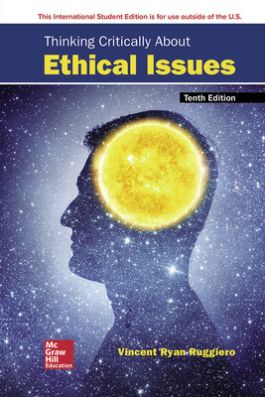Thinking Critically about Ethical Issues ISE
10th Edition
1260568962
·
9781260568967
© 2020 | Published: January 31, 2019
Thinking Critically About Ethical Issues encourages students to reason out for themselves the best answers to moral problems, rather than providing neat answers for students to swallow and regurgitate. Striking a balance between the theoretical and t…
Read More
After purchasing your eBook, login to the McGraw Hill Bookshelf website and redeem the access code from your order confirmation email.
- Access your eBook online or offline
- Easily highlight and take notes
- Fully searchable content
- Syncs across platforms
NOTE: eBook purchase does not include Connect homework or adaptive SmartBook assignments
Thinking Critically About Ethical Issues, 10e
CHAPTER 1: Preliminary Considerations
CHAPTER 2: The Role of the Majority View
CHAPTER 3: The Role of Feelings
CHAPTER 4: The Role of Conscience
CHAPTER 5: Comparing Cultures
CHAPTER 6: A Foundation for Judgment
CHAPTER 7: The Basic Criteria
CHAPTER 8: Considering Consequences
CHAPTER 9: Considering Obligations
CHAPTER 10: Considering Moral Ideals
CHAPTER 11: Determining Moral Responsibility
CHAPTER 12: A Perspective on History
CONTEMPORARY ETHICAL CONTROVERSIES:
Education
Media and the Arts
Sex
Government
Law
Business
Medicine
Science
War
CHAPTER 1: Preliminary Considerations
CHAPTER 2: The Role of the Majority View
CHAPTER 3: The Role of Feelings
CHAPTER 4: The Role of Conscience
CHAPTER 5: Comparing Cultures
CHAPTER 6: A Foundation for Judgment
CHAPTER 7: The Basic Criteria
CHAPTER 8: Considering Consequences
CHAPTER 9: Considering Obligations
CHAPTER 10: Considering Moral Ideals
CHAPTER 11: Determining Moral Responsibility
CHAPTER 12: A Perspective on History
CONTEMPORARY ETHICAL CONTROVERSIES:
Education
Media and the Arts
Sex
Government
Law
Business
Medicine
Science
War
Thinking Critically About Ethical Issues encourages students to reason out for themselves the best answers to moral problems, rather than providing neat answers for students to swallow and regurgitate. Striking a balance between the theoretical and the practical, Ruggiero's text discusses the history of ethics, but focuses on doing ethics to promote critical thinking skills and to help students acquire confidence in their own judgement. The short chapter length allows students to spend less time reading and more time doing ethical analysis.

